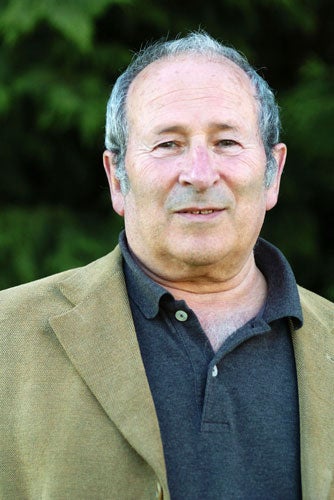Passed/Failed: An education in the life of Arnold Wesker, playwright
'I looked up the teacher's skirt'

Your support helps us to tell the story
From reproductive rights to climate change to Big Tech, The Independent is on the ground when the story is developing. Whether it's investigating the financials of Elon Musk's pro-Trump PAC or producing our latest documentary, 'The A Word', which shines a light on the American women fighting for reproductive rights, we know how important it is to parse out the facts from the messaging.
At such a critical moment in US history, we need reporters on the ground. Your donation allows us to keep sending journalists to speak to both sides of the story.
The Independent is trusted by Americans across the entire political spectrum. And unlike many other quality news outlets, we choose not to lock Americans out of our reporting and analysis with paywalls. We believe quality journalism should be available to everyone, paid for by those who can afford it.
Your support makes all the difference.Sir Arnold Wesker, 76, is the author of 42 plays, including The Kitchen, Roots and Chips with Everything. His non-fiction includes As Much as I Dare, his autobiography. Wesker's Love Plays, Wesker's Monologues, and the playwright's first poetry collection, All Things Tire of Themselves, have all been published recently.
I was unschooled; the war disrupted my education. I never really liked school; part of me thought I didn't need it because I got my education from books and the radio. At the Jewish Infants School, in Whitechapel, I remember looking up the skirt of one teacher; I was sexually precocious. Then I went to Christ Church Primary, where the majority of the children were Jewish; from the playground I could see the back of the tenement that we lived in.
Then the war broke out. My sister went to a good school in Spitalfields, the Central Foundation Girls' School, which was evacuated to Ely. She was eight years older and concerned about me, so I went with her. I must have gone to a school there but have no memory of it. My sister wanted to go back to London to join in the war effort, so she left me in Ely to work in a munitions factory, and I nagged to go back to London, too.
I was in London during the worst of the Blitz, and went to Deal Street School, though I have no visual memory of it. I was evacuated to Buckingham to stay with a very unpleasant woman, then to Barnstaple, where my aunt and cousins lived. At about 11, in an end-of-term school show, I recall the wonderful sensation when I rose to my feet with a crown on my head, and said, "The beggar maid shall be my queen!".
I then returned to live with my parents, who had moved to a council flat in Hackney, and went to Northwold Road School, where I think I took exams that were the equivalent of the 11-plus. I didn't pass (unsurprising, considering my fragmented schooling), but I was recommended for Upton House Central School, where boys who had failed but were obviously bright were sent to be groomed as clerks. We learnt shorthand and typing but no Latin: French was the only language. Because of the doodlebugs and V-2s, we were again evacuated, this time to Llantrisant, in South Wales. I went to school there until I came back to London, but again I have no memory of it.
Upton House is the one school I have strong memories of. I think it was a good school, except for the science teacher who was boring and feeble. "Wonderful" Walsh, the English teacher, gave me low marks for spelling and grammar, but high marks for imagination. I liked geography because I liked drawing maps, and geometry appealed: in some exams I cheated and came second, so I had to be good at it from then on.
I would have taken the Cambridge Certificate exams at 15. I passed maths, history, geography and, I suppose, shorthand. I certainly did well in typing. But I got a mere pass in English; writing where my fancy took me was obviously intolerable to the examiners.
I wasn't university material, but I regret not going. It would have given me a spreadsheet of learning, without which my studies remained haphazard. Also, the theatre is full of clubs of people who went to university and are comfortable with each other.
Join our commenting forum
Join thought-provoking conversations, follow other Independent readers and see their replies
Comments